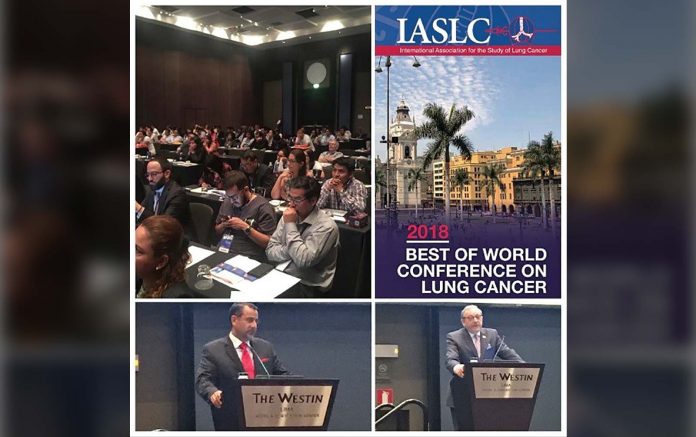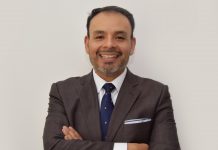
By Dr. Luis E. Raez, MD
Posted: October 2018
Peru is one of the largest Latin American countries, with a population of approximately 28 million people. Cancer is not yet a leading cause of mortality because of the young median age of the population and other factors like the high prevalence of infectious diseases; in addition, lung cancer is simply not as prevalent as it is in the United States. However, cancer remains a major public health issue in Peru: each year, 47,000 new cancer cases are diagnosed, with at least 25,000 deaths. As it stands, lung cancer is the third leading cause of cancer-related death in Peru, just below cervical and breast cancers. In addition, lung cancer is diagnosed in late stage in 85% of patients, and its incidence is not only related to tobacco smoking or radon but may additionally be linked to wood-burning stoves, which are still used for cooking in the Andean regions.
There is no formal lung cancer screening program in the country, as is the case in most Latin American countries (as of April 2018, only Brazil and Uruguay have such programs), nor are there any plans or polices in place to implement such programs any time in the near future. My colleagues and I discussed this issue extensively in recently published review in Journal of Global Oncology.1 In this paper, we also discussed particular challenges for the Latin American region, such as the high prevalence of granulomatous disease, which can complicate the interpretation of screening studies and potentially impair the efficacy of lowdose CT screening.
Adequate diagnostic tools, such as genomic profiling for stage IV disease, are of limited availability and are performed only sporadically. In addition, the gene panels are very small, and most of the diagnostic companies that perform next-generation sequencing have not yet started conducting business in Latin America. For this reason, the implementation of targeted therapy is behind that of higher-income countries because genomic profiling is essential to identification of the proper targeted therapy. In addition, the new agents approved for targeted therapy by the U.S. Food and Drug Administration have experienced delayed approval in Peru for months, if not years, as is the case in most of Latin America. The same problems exist for immunotherapy, where approval delays limit access. The first three immunotherapy agents—nivolumab, pembrolizumab, and atezolizumab—are now available in just a few countries, such as Peru, which is ahead of many other Latin American countries regarding standard treatment in the second-line setting and beyond. It is imperative that we create policies to make these therapies available to the majority of patients with lung cancer, who are being treated in the public healthcare systems; the benefits of these more novel treatments are currently confined to the private sector, where the use of targeted therapy and immunotherapy is concentrated.
IASLC-LATAM Initiatives
My colleagues and I have published several articles including, most recently, an article in Lung Cancer,2 outlining the challenges of managing lung cancer care in Peru and Latin America. In that regard, with the help of the IASLC, we have been trying to expand education and awareness at several levels to prepare the region to face these challenges.
In this regard, the IASLC Latin American Group (IASLC-LATAM) has successfully organized regular IASLC Latin-American Cancer Meetings (LALCA). These meetings were initially held every 2 years, but as of this year, they will be held annually starting with Córdoba, Argentina.
With the support of the IASLC CEO Fred R. Hirsch, MD, PhD, I have served as the meeting chair of several “Best of World Lung Cancer” Meetings in Lima, Peru successively for 3 years. The last meeting, held in early February 2018, was chaired by myself, along with the local chairs Carlos Vallejos, MD, and Luis Mas, MD. The meeting featured 18 speakers, including eight international speakers. Among them were Dr. Hirsch, IASLC-LATAM Board Member Clarissa Mathias, MD, and other IASLC speakers from the United States, Brazil, Chile, and Colombia. More than 180 physicians from Peru and other Latin American countries attended, where they had the opportunity to meet with members of the IASLC and were invited to join the organization.
Under the sponsorship of the IASLC, other smaller, regional, multidisciplinary meetings are being organized. For example, the Peruvian Association for Bronchology and Interventional Pulmonology organized two seminars on bronchoscopy ultrasound and navigational bronchoscopy in Lima, Peru in 2017. Two IASCL members, Pedro Garcia-Mantilla, MD, FCCP, a pulmonologist from Guillermo Almenara Hospital in Lima, Peru, and Francisco Tarrazzi, MD, from Memorial Cancer Institute, Miami-Florida, were among the faculty, and Dr. Garcia-Mantilla chaired both events. This meeting included a lesson on endobronchial ultrasound that was actually conducted with real patients who were previously classified as difficult cases with unstaged disease and who did not previously have access to these technologies.
Finally, thanks to the initiative of Christian Rolfo, MD, PhD, MBA, from the IASLC Education Committee, the IASLC LATAM Group has been able to conduct the IASLC School of Oncology, which has focused on training earlycareer oncologists in Chile, Costa Rica, and Peru for the past 3 years.
These IASLC initiatives and others are crucial for cancer care specialists and patients in Peru and other countries. With continued support and continuing education, the IASLC-LATAM group will continue to confront the many challenges that exist in the battle against lung cancer in the years to come, with the goal of improving patient care and outcomes. ✦
About the Author: Dr. Raez is chair of the IASLCLatin American (LATAM) Group and chief of hematology/oncology and medical director of Memorial Cancer Institute at Memorial Healthcare System in Miami-Florida.
References:
1. Raez LE, Nogueira A, Santos ES, et al. Challenges in Lung Cancer Screening in Latin America. J Glob Oncol. 2018;4:1-10.
2. Raez LE, Cardona AF, Santos ES, et al. The burden of lung cancer in Latin-America and challenges in the access to genomic profiling, immunotherapy and targeted treatments. Lung Cancer. 2018;119:7-13.










